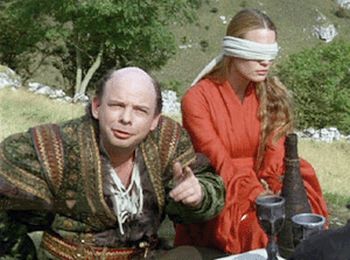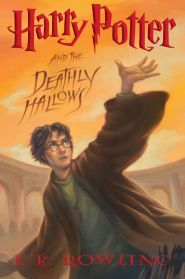Vizzini: So. It has come down to the final Harry Potter novel, Harry Potter and the Deathly Hallows. Let me put it this way. Have you ever heard of Tolkien, Le Guin, Moorcock? Morons!
Man in Black: Really! In that case, I challenge you to a battle of wits.
 Vizzini: I accept!
Vizzini: I accept!
Man in Black: All right. Will Harry Potter die or will Voldemort die? The battle of wits has begun! It ends when J.K. Rowling decides, and we all read, and find out who is right — and who is dead.
Vizzini: But it’s so simple! All we need to do is divine from what we know of J.K. Rowling: is she the sort of woman who would kill off her protagonist, or her villain? Now, a clever author would kill off her protagonist, because she would know that only a great fool would assume that the beloved protagonist of a popular series of novels is safe. We are not great fools, so we can clearly not bet on Harry Potter to die. But J.K. Rowling must have known we were not great fools; she would have counted on it! So we can clearly not bet on Voldemort to die.
Man in Black: You’ve made your decision then?
Vizzini: Not remotely! Because while J.K. Rowling pretends to be a novelist with a dark and sinister side, she’s really a sentimental crowd pleaser at heart. And she knows that killing off her protagonist would be very distressing to much of her young audience. So clearly, though she’s going to string us along, she won’t do something so dark as to have Harry Potter die in the end. She’ll go for the cheery, crowd-pleasing ending of having Voldemort die and Harry Potter triumph.
Man in Black: But she’s already killed off beloved characters before, like Sirius Black and Dumbledore.
Vizzini: And I think there’s a good chance she’s going to bring Sirius back before the end of Deathly Hallows too. Either that or she’s going to hint somehow that he’s still alive, or Harry can still communicate with him through the grave, or something like that.
Man in Black: Truly, you have a dizzying intellect.
Vizzini: Wait ’til I get going! Where was I?
Man in Black: Dumbledore.
Vizzini: Yes! Dumbledore! As for Dumbledore — you realize that he expected to die, and even planned for it? In fact, if you carefully re-read Harry Potter and the Half-Blood Prince, you realize that all the time Dumbledore is begging Snape to keep his vow and do what he promised, he’s actually begging Snape to kill him when the time comes. Snape has been acting so mopey throughout the series because he doesn’t want to go through with it and pretend to join Voldemort’s side, even though he promised Dumbledore he would.
Man in Black: So who will die then? Rowling’s already claimed several characters will die.
Vizzini: Not Ron or Hermione, that’s for sure. They’re going to get together by the end of the book, Rowling’s been hinting at that for ages. I doubt Ginny Weasley will die either, because Rowling’s set Ginny up to be Harry’s love interest — though I wouldn’t rule out Ginny being another tragic loss Harry has to endure before the end. I’m guessing that Snape will die in the act of saving Harry and thus become your classic tragically misunderstood martyr character. I would have bet on Neville too if I hadn’t heard that they cut out the parts about Neville and the prophecy from the Order of the Phoenix movie. Now I’m convinced that all along he was just a red herring. Draco Malfoy might bite it too, although Malfoy strikes me as a likely candidate for either sudden repentance at a last, crucial moment, or as the bad guy who’s going to stick around and endure the punishment at the end of the book.
 Man in Black: What makes you so sure that Harry won’t be the one to die?
Man in Black: What makes you so sure that Harry won’t be the one to die?
Vizzini: Because the whole series is set up as a coming of age story for Harry. With a few exceptions, just about every chapter in all six books has been set from Harry’s point of view. The series begins when he’s eleven — just entering his teenage years — and ends when he’s eighteen — a symbolic age for the passage to adulthood. Rowling’s not writing a martyrdom story here or a parable about Jesus; she’s writing the classic passage-to-adulthood story. And we all know how this story goes: the protagonist begins young and naive, he faces great challenges, and eventually he vanquishes his enemy, but not without great sacrifice along the way. He emerges from the story older and wiser, triumphant but having learned that life requires hard work and sacrifice. Harry can’t very well learn that lesson if he’s dead, can he?
Man in Black: But Rowling has hinted several times that Harry might not be safe.
Vizzini: Marketing hokum! J.K. Rowling is terrific at it. Plus she loves red herrings. Remember that scene in Order of the Phoenix where she made us believe, for just a moment, that Mr. Weasley had died? Why put that in the book? Because she got a nice little thrill from telling everyone that a major character was going to die in that book, and it’s just so much fun to play around with readers’ expectations.
Man in Black: You’re really so sure that Harry’s not going to die then.
Vizzini: Well, I’m sure that having Harry live is what she should do. But keep in mind that making predictions about the outcome of the series is nothing more than a guessing game. Like any good novelist, Rowling’s stuck omens and portents in the books that could lead to any number of possible outcomes. There’s evidence to support just about any conclusion you might draw. It’s all a question of what kind of person Rowling is, and what kind of endcap she feels like putting on her series. I suspect she’ll leave Harry alive, but she’ll kill one or two tertiary characters simply because she has to to keep up the suspense. But she’ll also leave enough openings and a few juicy unresolved mysteries just in case she decides to write sequels.
Man in Black: What else is going to happen in Harry Potter and the Deathly Hallows?
Vizzini: I don’t have high hopes for the book, because I suspect that every character from the past six books is going to pop in for a farewell cameo. It could prove to be very messy. That’s what happens when you get such phenomenal success so early — it affects what you write. J.K. Rowling’s probably gotten a thousand letters from children all over the world begging to hear what happens to every minor, insignificant character in the series, and I’m afraid she’s going to try to oblige them all.
Man in Black: So will Harry Potter and the Deathly Hallows sell less than 20 million copies?
Vizzini: That would be totally, and in all other ways, inconceivable.